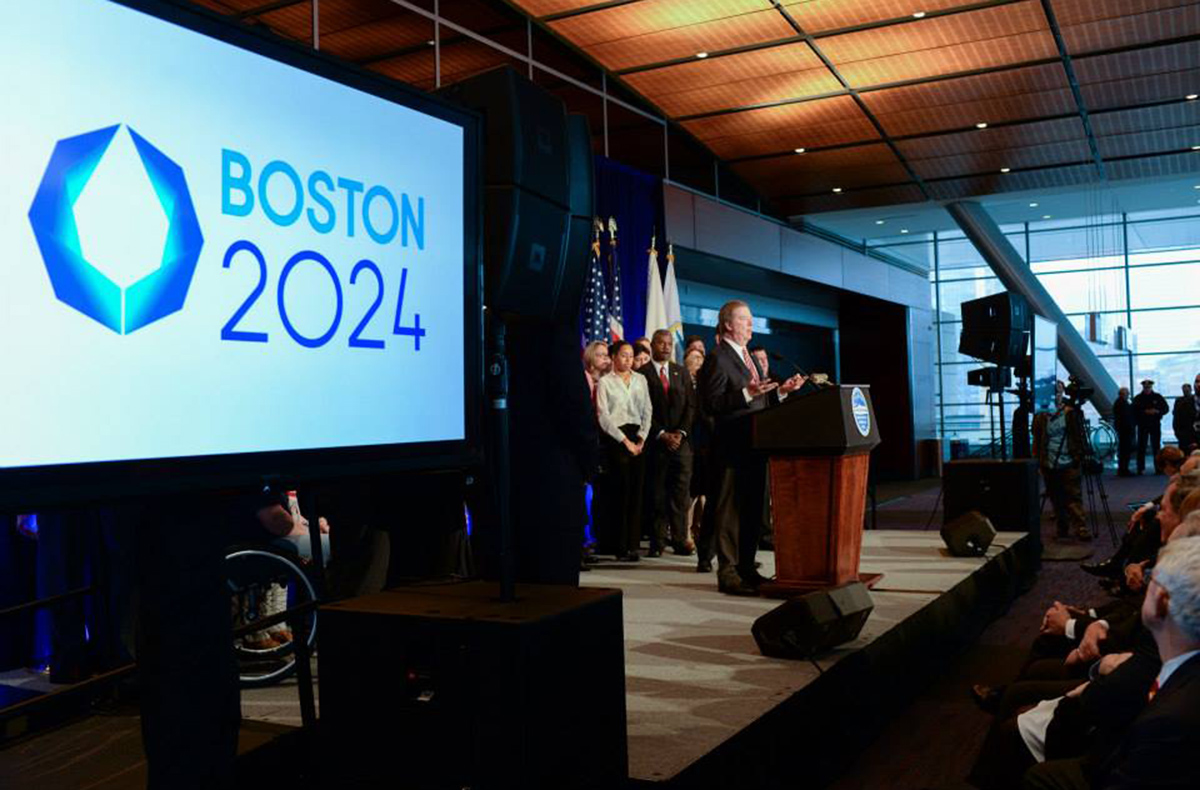Newly Released Boston 2024 Budget Details Contained in UMass Records

Image via Boston2024 on Facebook
More specific budget numbers for key venues in Boston 2024’s Olympic bid are contained in the bundle of UMass emails and documents obtained by Boston lawyer Joel Fleming via public records request earlier this week. These numbers outline out the bid’s budget in greater detail than organizers have already publicly made available, though may not be up to date.
One confidential document, provided to the UMass Donahue Institute (UMDI), provides line-by-line budget numbers for three key venues, whose construction has been a point of contention for critics of the bid: the Athletes Village at UMass Boston in Columbia Point; the temporary, 60,000-seat stadium in Widett Circle, and the International Broadcast Center (IBC)/Main Press Center (MPC) near the Boston Convention and Events Center in the Seaport District.
The numbers are broken down into OCOG (Organizing Committee for the Olympic Games) costs and non-OCOG costs. The $4.7 billion OCOG budget is privately funded and would cover the construction of temporary venues as well as the cost of putting on the games themselves. The $3.4 billion non-OCOG budget, separate from the operating budget, would be funded by a public/private partnership.
For each of these three venues, the non-OCOG cost is higher than the OCOG. While the total OCOG cost for the IBC/MPC have been budgeted within $200,000, nowhere are cost overruns factored in. UMDI senior researcher Mark Melnik asked Boston 2024 general counsel Emiley Lockhart about this in a December 11, 2014 email, also included in Fleming’s bundle.
“Would the insurance premiums for cost overruns be covered by the OCOG budget? Is that cost already built in to the budget?” Melnik asked. Lockhart’s response:
To answer your question below about cost overruns and insurance, I can offer the following: Under the IOC rules, the City must be a party to the Host City Contract and, therefore make commitments, including a general financial guarantee. From the start, Boston 2024 has made it clear that it will do everything possible to avoid the City having exposure under its guarantee by protecting against cost overruns and other financial risks. Such protections include, but are not limited to, an insurance package. While the insurance will be obtained in the name of the City and the City will be a beneficiary (thus making the City’s strong credit a relevant factor in the determination of the premiums) the premiums would be paid from the budget for the Games at no cost to the City. Further, Boston 2024 will fully indemnify the City for all of its obligations.
“The transparency that Boston 2024 has bragged about for so long is a joke,” former gubernatorial candidate and United Independent Party head Evan Falchuk told Boston in an email. “Detailed disclosures about this bid haven’t been offered up by Boston 2024, they’ve been extracted from them.”
The same document also breaks down OCOG and non-OCOG costs by sporting event. Many events are listed with a non-OCOG cost of zero. For example, a temporary, 7,000-person shooting range is budgeted for $40 million entirely in OCOG, while a planned 10,000-person venue for handball is budgeted for $5 million in OCOG and $78.5 million in non-OCOG. The proposed velodrome track in Somerville’s Assembly Square, which Mayor Joe Curtatone has publicly opposed, is split, with $30 million budgeted in both OCOG and non-OCOG.
“We are in the early stages of what will be a long and collaborative process that will include extensive public input, and the very preliminary projections that are referred to were just that – preliminary,” says Boston 2024 vice president Erin Murphy. “We will be releasing updated budget and venue proposals based on this extensive public input in the coming months.”
“What we see in these documents is that this is a very costly bid—it requires building the three most expensive Olympic venues from scratch,” Christopher Dempsey of No Boston Olympics said in an email. “London’s Olympic organizers estimated they would spend less than $600 million on those venues — but after overruns they spent more than $1.4 billion. The worst part of all is that Massachusetts taxpayers will be on the hook when overruns happen here. This bid is just too risky, and these documents show that.”


